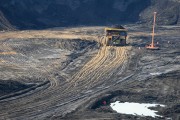For those of you who follow the oilsands debate closely, a certain quote may have made you choke on your Corn Flakes this week. It came at the end of a visit by a 12-member European Union delegation and was uttered by United Kingdom member Philip Bradbourn.
"I think . . . we came with a preconceived idea maybe we would be looking at some sort of disaster area and actually we weren't," Bradbourn said. " I think we were all satisfied that everything is being done that can be done to mitigate against any damage."
We wonder if he knew that the toxic tailings lakes that span an area larger than the City of Vancouver are known to seep into groundwater. Or if he considered the vast amounts of water and energy used to extract oil from the sands. We're also curious about whether he understood that the continued loss and fragmentation of boreal forest will further jeopardize endangered woodland caribou.
Given the wealth of reports we have published that highlight regulatory gaps around water use, land management, reclamation liability and cumulative effects , we were surprised by his comment to say the least and couldn't help but take a close look at what the delegation had been told during its time with the Alberta government and industry.
We know the members of the European parliament were at least informed of the environmental issues in the oilsands, because we did get 40 minutes of our own to present to them during their two-day visit to Alberta, but not surprisingly what they heard from us didn't totally line up with what they heard from government and industry.
It turns out that the government ignored the recently published, peer-reviewed research showing that oilsands development contributes to metals and toxins in the Athabasca River, instead continuing to perpetuate their hypothesis that pollution in the river is "all natural."
Given the government's obvious omission of information on water pollution, its also unlikely they were forthcoming about the fact our provincial climate regulations aren't credible, that Canada lacks a federal plan to meet its international commitments, that Alberta is currently standing to lose 200,000 hectares of wetlands and that tailings volumes are growing, not shrinking, due to inadequate regulation and enforcement. To top it all off, the government has approved at least a doubling of current production.
There is nothing more dangerous in diplomacy than over promising and under delivering. But that is exactly what we are doing.
Yet, an international delegation has left Alberta after hearing a range of promises on environmental action from our provincial government and a commitment from the chair of the delegation that oilsands would be treated fairly under a European fuel directive to reduce greenhouse gases. The fact is that fair treatment would mean the oilsands are penalized as a high-carbon source of energy, unless more progress is made to reduce emissions. Fair treatment would also mean the Alberta government needs to provide the whole truth to future delegations of decision-makers.









